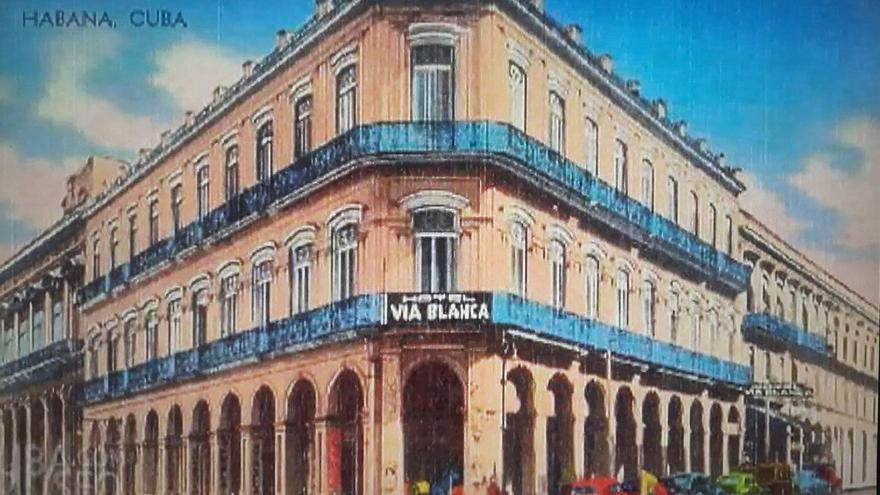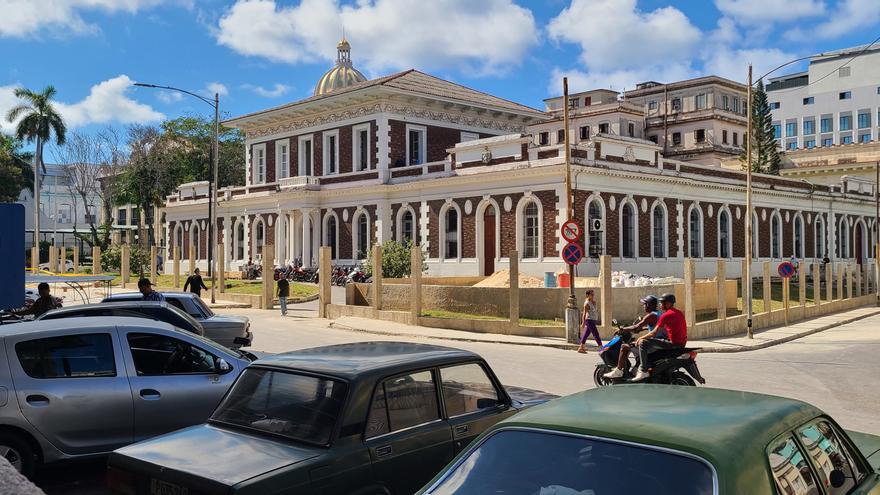
![]() 14ymedio, Nelson García/Juan Izquierdo, Havana, September 21, 2023 — Due to the magnitude of the damage and the lack of effort of the authorities to mitigate it, many buildings in Havana agree with Carpentier.* The “city of the columns” is barely left, with structures in ruin, paint chipped by moisture and vines invading arches and pillars.
14ymedio, Nelson García/Juan Izquierdo, Havana, September 21, 2023 — Due to the magnitude of the damage and the lack of effort of the authorities to mitigate it, many buildings in Havana agree with Carpentier.* The “city of the columns” is barely left, with structures in ruin, paint chipped by moisture and vines invading arches and pillars.
Such is the case of the old Vía Blanca hotel, located at 505 Zulueta Street, between Monte and Dragones, whose decadence the passers-by compare with that of a “haunted mansion” near which no one dares to walk anymore. In the postcards of the 1950s, however, the building was described as a residential gem with “large and ventilated rooms.”
The destruction of the Zulueta 505 building is slow but still dramatic. The Government has been promising for years a repair of which, today, there is only one sign: the gigantic scaffolding that underpins the facade and on which climbing plants and rust have been growing for a long time.
The Government has been promising for years a repair of which, today, there is only one sign: the gigantic scaffolding that underpins the facade
In 2020, the nine families who lived in the building, several of them with children, were relocated under the pretext of restoring it. “Until that moment they lived at risk of being buried by a collapse,” recalls Rogelio, a 71-year-old retiree who lives in the neighboring building.
In conversation with this newspaper, Rogelio describes the long ordeal of the neighbors since, in 1995, they received the notification that they would be transferred to better houses in zone 11 of Alamar-Habana del Este. He pointed to the Office of the Historian, whose director, Eusebio Leal, began to earn the trust of Fidel Castro and to get streams of foreign capital, indispensable after the fall of the Soviet Union.

“It was all a lie,” concludes the old man, who is amused that the policemen of the well-known Dragones station – located in front of the building – have to dodge the scaffolding and constantly look up, in case some “loose” stone is about to fall, by chance, near them.
Not infrequently, Rogelio recalls, the neighbors tried to go to the police unit for the help of those same agents, who ignored them. On the other hand, the station does not lack paint or maintenance. In fact, the Ministry of the Interior is building a fence around the neoclassical building, with its windows covered by powerful bars, behind which the Capitol stands out.
“Nor do they like to park their cars nearby, in case a collapse occurs,” he notes, pointing to the row of police vehicles”
“Nor do they like to park their cars nearby, in case a collapse occurs,” he notes, pointing to the row of police vehicles.
Nature and the Government’s laziness are not the only things that have wreaked havoc on Zulueta 505. Drunks, beggars and other nocturnal “guests” resort to the arcades to “do their deeds,” according to Rogelio’s euphemism. What used to be “ghostly,” he adds, is now barely sordid: garbage and debris complete the picture.
Despite its proximity to the police station, the building has also served as a kind of sanctuary for all kinds of thugs. In the darkness on Zulueta Street, those who seize a wallet or a cell phone with a knife have the ideal shelter behind the arcades and the barrier of scaffolding. “No one is going to risk going in there to look for the thief,” Rogelio says.

Xiomara, a 45-year-old housewife, has spent most of her life contemplating the desolation of the corner of Zulueta and Dragones. For her, the only “solution” is collapse, helped by rain or a windstorm. The authorities have proven to be useless, and the only measure they have taken is to place some scrawny yellow tape on the scaffolding. Only those who approach closely can read it: “Danger of total collapse.” Xiomara doesn’t need the warning. A few days ago, when she came back from the line for buying chicken, a fragment of the wall of Zulueta 505 almost struck her.
Several decades of broken promises have cured her of fear. Now she only expects a “foreign firm” to buy the land “with ruins and everything.” “If that happens, they will not return the building to the families who lost it,” says Xiomara. “They will most likely build another hotel.”
*Translator’s note: Alejo Carpentier, a Cuban writer, called Havana “the city of columns.”
Translated by Regina Anavy
_______________________
COLLABORATE WITH OUR WORK: The 14ymedio team is committed to practicing serious journalism that reflects Cuba’s reality in all its depth. Thank you for joining us on this long journey. We invite you to continue supporting us by becoming a member of 14ymedio now. Together we can continue transforming journalism in Cuba.
